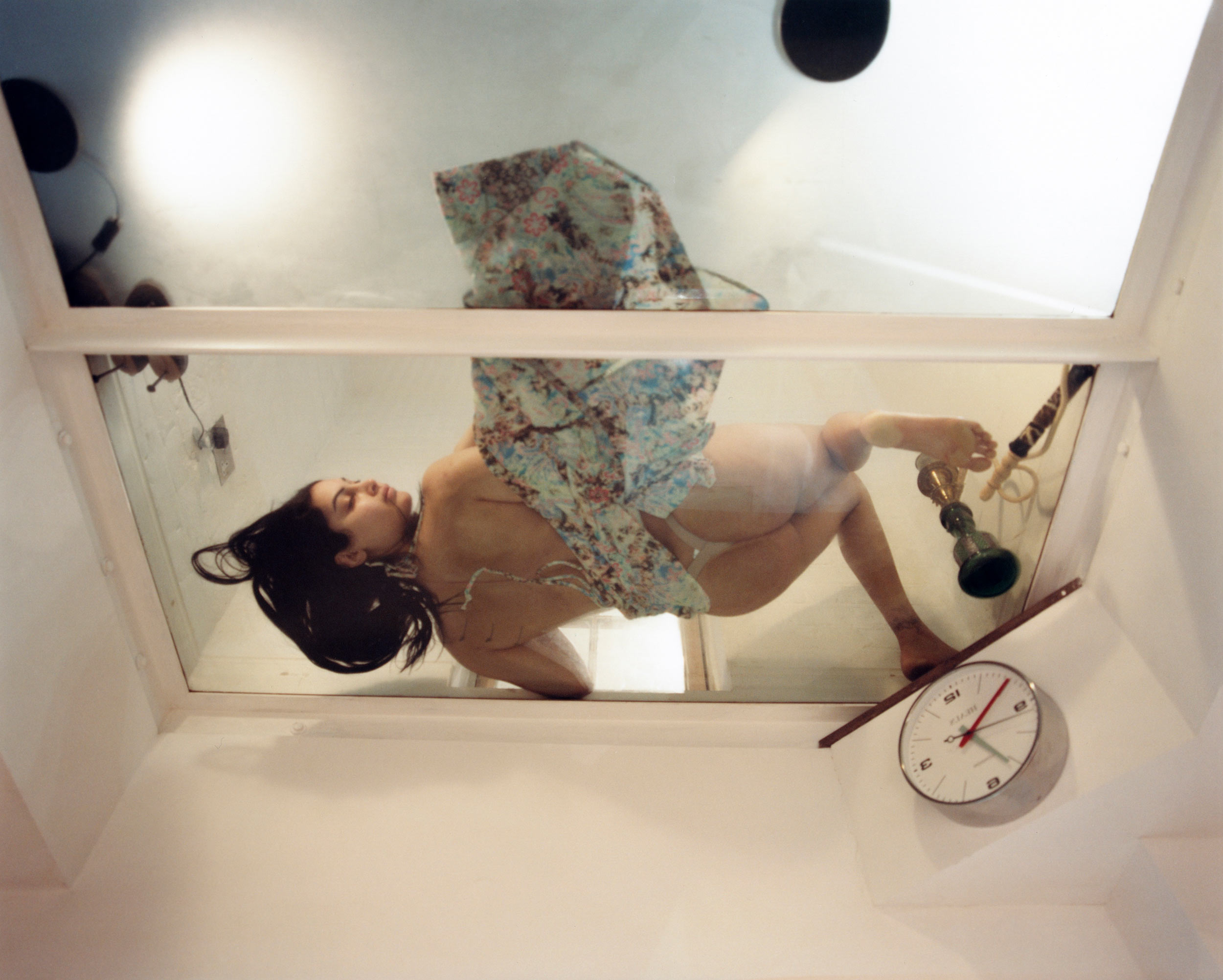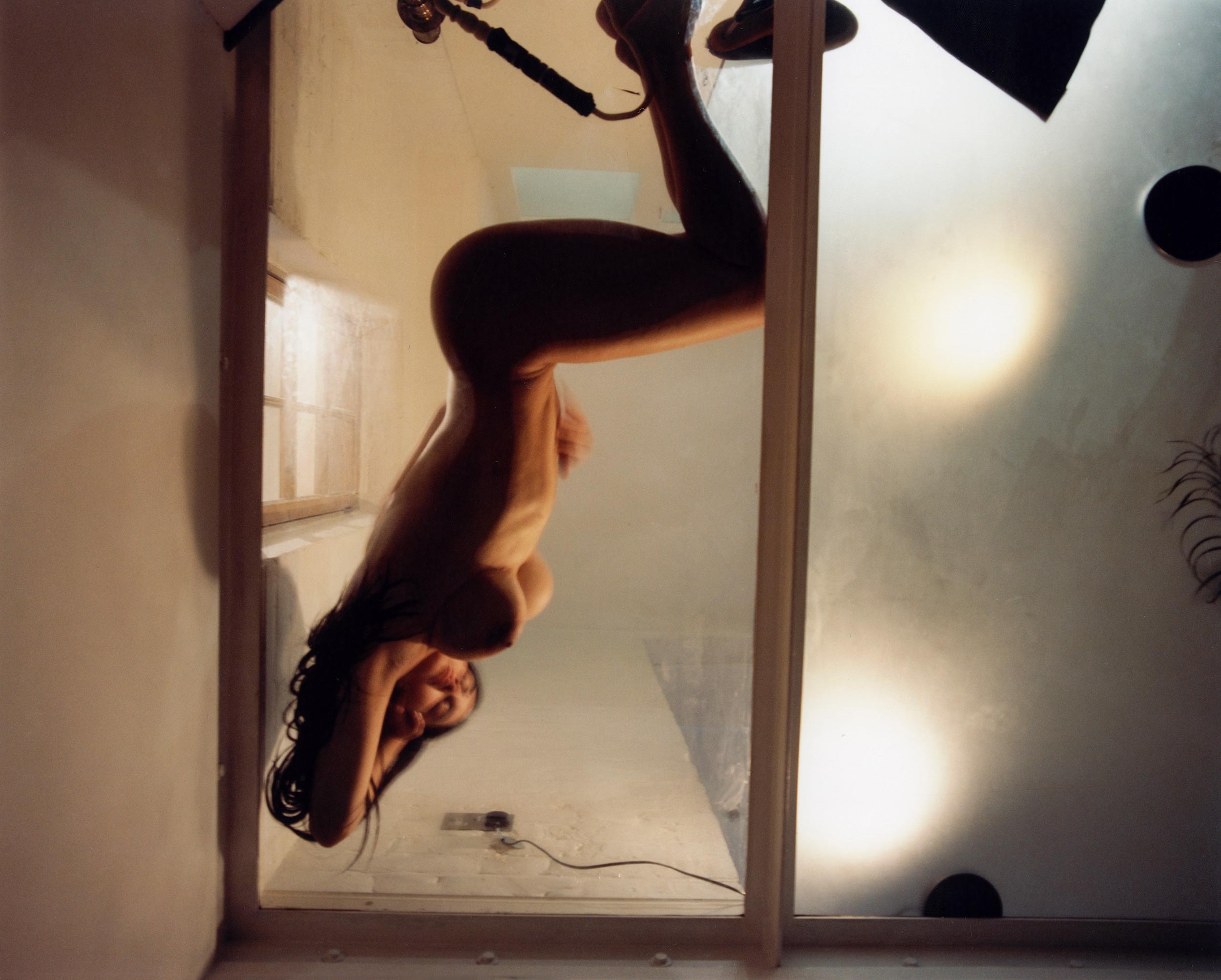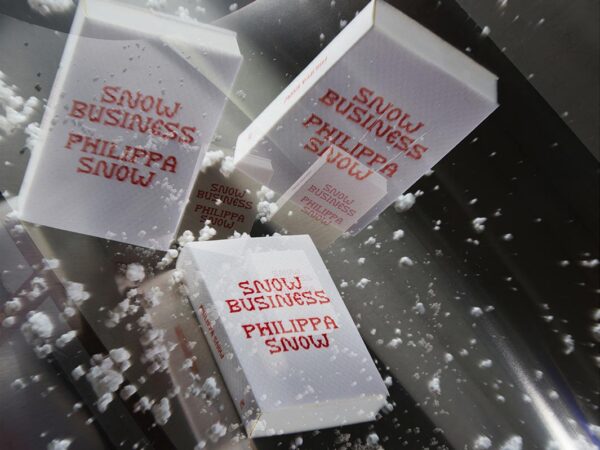The NYC-based DJ discusses her EP’s intimate sonic journey, the emotional toll of creation, and her decade-long relationship with the city
As a DJ, Sausha is known for her frenetic, high-energy sets, dense with texture and disparate influences. With her debut EP, premiering today, she’s opted to turn inward, translating the kinetic energy of the booth into something more intimate and uncanny. The result is a collection of tracks best swallowed without chaser, its bitter aftertaste addictive by the second or third dose.
The cover art for Sausha’s self-titled EP captures the artist nude on a pink satin bed, gazing upward at a mirrored ceiling. Her reflection is multiplied and refracted—legs doubled, arms tripled, eyes repeated across her skin as if divine symbols. The image (made by Allan Taylor), is much like her music, both confrontational and curious, suggesting a figure unbound by form or classification.
Across three tracks (and an additional vocal edit), Sausha’s sonic aggression gives way to a strange sensuality. Industrial noise fuses with the sounds of salsa and champeta. Yet the project is less a genre mashup than a reconstitution—music that’s been pulled apart and sewn back together, gaining sharpened edges in the new assemblage. There’s a raw physicality here: songs that scratch and pulse, that feel like they’re working something out in real time.
I sat down with Sausha in an exclusive interview for Document and went through the EP track-by-track, unpacking the samples behind the songs, her love-hate relationship with New York, and how the project fits in with her work in nightlife.
“I need people around me that inspire me in some kind of way. Otherwise it’s a chop”
Ryan Petersen: How did the initial idea for the EP come about? And how did the label Halcyon Veil get involved?
Sausha: Initially I was just working on the tracks individually. I spoke to Rabit and knew I wanted to do something with Halcyon Veil, but wasn’t sure what exactly. We had a few conversations that eventually led to the idea of releasing through the label. I’ve always been a fan and was super keen once the idea was on the table.
Ryan: What was the recording process like? Was it mostly made in NYC?
Sausha: Yeah it was all done here in NYC. I used my Access Virus B synth but other than that it was mostly Ableton. When I started I was a lot less knowledgeable in producing so it got a bit frustrating at points, but I tried to have as much fun as possible.
There were a lot of different nights in my old apartment where I had my studio monitors blasting the same track over and over and me pacing around, probably high on something, trying to figure out what it needed. It was a lot more of an emotional process than I imagined. You always hear people talking about how taxing making music can be, but it’s a whole different spiral when you are actually there doing it. This release rollout has been just as emotional as the making of it, too. I will say, I’m super thankful to have the people in my life who helped make this possible. I received a lot of help from Chicken & Harley (Flirty800), who both offered their studios for me to record vocals, chop things up, etc.
BOAT / BLACK BOAT ORAL FT YAKI
Ryan: So the “Oral” version of the song features Yaki—how’d that come about? What was your guys’ song-writing process like?
Sausha: I think it came about from me just showing her the instrumental track and her loving it and wanting to do a verse for it. When she asked I immediately said yes and within like a week or so we were at Chicken’s studio recording it. We wrote our verses separately and then recorded it all in one session. I had no idea what her verse was gonna be but she got in the booth and just laid it down and it was amazing. I think it was a one-take-wonder type thing. We may have recorded a couple but I’m pretty sure we just went with the first one because it was just so perfect right off the bat. Yaki killed it—she really captured a moment.
Ryan: This song feels very New York, as the city is right now, in its current iteration. Sexy, but also bleak and unnerving. Is this song (or the EP in general) influenced by your time in the city? What’s your current relationship with New York like?
Sausha: My relationship to the city is a love and hate one, as always. It’s been rough lately…but it’s the most addicting type of rough. It made me who I am, obviously. This is my 10th year in New York now and I was thinking about it. It’s the city I’ve lived in the longest so it’s bred me, in a way. I don’t know, I think the project generally speaks for itself, but I made a lot of the decisions about the EP as I was listening to bits of it back while walking around the city and really feeling it out, which I think kind of comes through in the music. In general though, New York opened my mind and pushed me to be experimental. Now I just want to keep pushing back.
TRAMPA (COAST)
Ryan: You sample Atari Teenage Riot in this song, right? How’d that come about?
Sausha: Yeah it’s actually from Hanin Elias’ solo project “Get it Back.” I’d been listening to her album nonstop for a couple months and knew I wanted to do something with it. Her voice, and generally all of the production on that specific project, really became one of my main sources of inspiration.
Ryan: The overall sound of the whole EP is a mix of industrial with reggaeton and cumbia. What made you want to blend these genres together? How do you see them relating to each other, if at all?
Sausha: They’re very different worlds obviously, but the few people who live in both know they’re actually kind of similar. It’s funny because I feel like whenever you play industrial music for someone exclusively in the latin genre world, they freak out and don’t know what to do and the same could be said vice-versa. But [industrial music and latin music] both exist around a dance culture. I’ve always been super into combining things that maybe shouldn’t be or don’t initially make sense when mixed together. That contrast can actually resolve into something beautiful. And something that feels like uncharted territory. I’ve said this before, but my work is fueled by my addiction to novelty. I have a need to do things and experiment with shit that maybe hasn’t been done before.
REDUX OF DESPAIR
Ryan: You’ve said the EP is “a reflection of the people and moments that shaped you.” Does any one person or memory come to mind for this song?
Sausha: Christian [Velasquez]! He’s the one that pushed me to make something out of this “Death in June” track. His exact words were that I should “freak it.” So I did and I really loved it and ended up using it for this project. I love our relationship and I love that we constantly inspire each other. I need people around me that inspire me in some kind of way. Otherwise it’s a chop.
Ryan: “Redux” feels the most club-ready track on the EP. How do these songs relate to your DJing? Are they completely separate? Or could you see them existing in one of your sets?
Sausha: Yeah I agree. I just used it as kind of an intro for this mix I did for BBC radio. I think they all relate to my DJ style and its evolution. It’s all super layered which is how I prefer to play. I really enjoy just playing around over the span of three or four CDJs and, essentially, that’s how my brain was able to formulate a lot of these tracks. It’s obviously a pretty sample heavy EP and that’s due to everything being initially sketched out thru CDJs. So the club is a part of the identity of the EP, in a way. It’s kind of a nod to it, but at the same time showing what I can give outside of that context.
Ryan: Ok final question: if this EP was a Real Housewife, who do you think she’d be?
Sausha: Lowkey, Carlton from Beverly Hills is the first person that came to mind, which is kind of a cringe answer—but it’s the truth! I can’t think of anyone else listening to it. But also I kind of have this vision of Sonja Morgan singing Yaki’s part on Black Boat while crawling on the floor. Need that to happen.





















